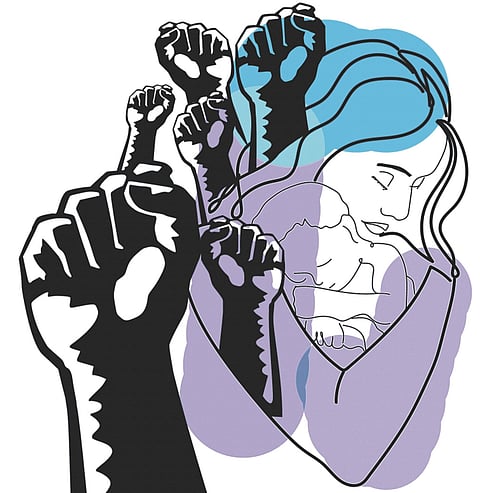'Normal Is Unacceptable': Seattle Author Angela Garbes on Parenting Through the Pandemic
Book Review: Essential Labor: Mothering as Social Change by Angela Garbes
by Jennifer Astion
(This article was originally published on Real Change and has been reprinted under an agreement.)
In Essential Labor: Mothering as Social Change, Angela Garbes examines why "American life is not working for families." Child rearing, Garbes writes, is "a social responsibility, one that requires robust community support. The pandemic revealed that mothering is the only truly essential work humans do. Without people to care for our children, we are lost." Essential Labor makes a compelling argument for valuing mothering through both personal stories and social critique.
The book is partly a memoir about being the daughter of immigrants. Garbes writes lovingly of her parents, who left the Philippines in 1971 to raise their family in a small town in rural Pennsylvania. They worked long hours and tried to shield their children from the "complexities of the world." Garbes shares that her father knew three languages but spoke only English with her because he did not want her to face "the discrimination he endured because of his accent."
During the pandemic, Garbes took on most of the parenting of her two young children and had no time for her work as a writer. "I began to doubt my own sense of self." At the same time, she acknowledged that the crisis was not personal or based on any of her own decisions. Challenges for caregivers are "built into labor and financial institutions; they are, by design, foundational to American life."
She addresses the roots of the poverty-level wages paid to caregivers. "We are entrusting that which we say is most precious — our children, our future — to other people, yet we are not willing to pay them a living wage?" Garbes argues that low pay for child care workers is founded in both capitalism and colonization. "At the heart of both lies the impulse to draw a line between beings with power and beings to be domesticated, to create cultural binaries of civilized versus natural, modern versus primitive, with what is supposedly civilized and modern being superior."
Garbes notes the disastrous impact of the pandemic on American women who had to leave the workforce when schools closed and jobs disappeared. "Unemployment hit Black and brown women the hardest, as restaurants, salons, and child care centers shut down early, some never to reopen." When women spend time out of the workforce, they face a long-term financial detriment. They "lose money not only in the form of salaries, but also retirement funds and health-care benefits."
Garbes shows that collective action is one way to raise the status of women's work. In the 1975 women's strike in Iceland, 90% of women did not show up to work at home or in other workplaces. Factories and schools had to close. Eventually, women's work became more highly valued. "In 2018 Iceland became the first country in the world to require employers with more than twenty-five employees to give women and men equal pay for equal work."
To care for her children, Garbes created a supportive community that included her mother, friends, babysitters, and teachers. Nevertheless, structural failures remain. "Meal trains, playdates and hand-me-downs are not proper substitutes for a society that provides affordable childcare, adequate wages, and time for leisure, but these patchwork solutions are precisely how so many of us survive."
Garbes both acknowledges the hardships for caregivers and celebrates mothering as creative and valuable. Ultimately, her message is inspiring. "In a society that still believes a 'normal' person to be a cis, straight white man, so many of us are made to feel that we are, in some way or another, anomalies. As caregivers, we can affirm each child's existence."
Jennifer Astion is a freelance writer and yoga teacher who lives in Seattle.
Featured Image: Illustration by Henry Behrens. Original images by Pixabay.
Before you move on to the next story …
The South Seattle Emerald™ is brought to you by Rainmakers. Rainmakers give recurring gifts at any amount. With around 1,000 Rainmakers, the Emerald™ is truly community-driven local media. Help us keep BIPOC-led media free and accessible.
If just half of our readers signed up to give $6 a month, we wouldn't have to fundraise for the rest of the year. Small amounts make a difference.
We cannot do this work without you. Become a Rainmaker today!
Help keep BIPOC-led, community-powered journalism free — become a Rainmaker today.


